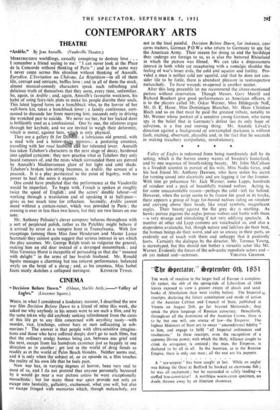CINEMA "Decision Before Dawn." (Odeon, Marble Arch.)—" Valley of Eagles."
(Liecester Square.)
WHEN, in what I considered a laudatory manner, I described the new war film Decision Before Dawn to a friend of mine this week, she asked me why anybody in his senses went to see such a film, and by the same token why did anybody seeking refreshment from the cares of this life go to any-film concerned with anything nasty—with murder, vice, lynchings, colour bars or men suffocating in sub- marines ? The answer is that people with ultra-sensitive imagina- tions and those who have suffered deeply don't go to such films, but that the ordinary stodgy human being can, between one grief and the next, escape from his humdrum existence just as happily in direction as in another ; get lost in the world of drug fiends as readily as in the world of Palm Beach blondes. Neither seems real, and it is only when the subject of, or an episode in, a film touches the reality of his own life that he feels pain. Now war has, in varying degrees of horror, been very real to most of us, and I do not pretend that anyone personally bereaved by it would go near a war picture unless he were exceptionally masochistic ; but for many these war epics provide not only an escape into bestiality, gallantry, excitement, what you will, but also an escape fringed with memories which, though melancholy, are .
not in the least painful. Decision Before Dawn, for instance, coma terns traitors, German P.O.W.s who return to Germany to spy for the American Army. Their reason for doing so and the hardships they undergo are foreign to us, as is also the battered Rhineland in which the picture was filmed. We can take a dispassionate interest in both while yet recapturing with a nostalgic shudder the feeling of war's lesser evils, the cold and squalor and futility. Pro- vided a man is neither cold nor squalid, and that he does not con- sider life to be futile, there is abundant pleasure in restrospective melancholy. To have wounds re-opened is another matter.
After this long preamble let me recommend the above-mentioned picture without reservation. Though Messrs. Gary Merrill and Richard Basehart give good performances as American officers, it is to the players called Mr. Oskar Werner, Miss Hildegarde Neff, Mr. 0. E. Hasse, Miss Dominique Blanchar, Mr. Hans Christian Blech and so on that must be paid the greatest tribute, notably to Mr. Werner whose portrait of a sensitive young German, who turns spy in the belief that in Germany's defeat lies its only hope of salvation, is a fine and moving thing. Mr. Anatole Litvak's direction against a background .of unexampled starkness is without fault, exciting, observant, plausible and, in the fact that he succeeds in making treachery sympathetic, revolutionary.
Valley of Eagles is redeemed from being inordinately dull by its setting, which is the barren snowy wastes of Sweden's hinterland, and by one sequence of breath-taking beauty. Mr. John McCallum is a Swedish scientist in pursuit of his wife, Miss Nadia Gray, and his best friend Mr. Anthony Dawson, who have stolen his secret for turning sound into electricity and are legging it for the frontier. With him go policeman Mr. Jack Warner, some Lapps, hundreds of reindeer and a pack of beautifully trained wolves. Acting is, for some unaccountable reason—perhaps the cold—left far behind. However, when the script seems to be frozen for good in its tracks, there appears a group of huge fur-bound natives riding on reindeer and carrying above their heads, like royal symbols, magnificent eagles. Their beauty' against the flat grey sky is startling. As . hawks pursue pigeons the eagles pursue wolves and battle with them —a very strange and stimulating if not very edifying spectacle. A number of other old Lapp customs are vouchsafed us, and also a stupendous avalanche, but, though nature and folklore do their best, the human beings do their worst; and are so uneasy in their parts, so evidently out of touch with them and unhappy that it positively hurts. Certainly the dialogue by the director, Mr. Terence Young, is stereotyped, but this should not bother a versatile actor like Mr. Warner. Evidently the forces of the sub-arctic repudiate actors and—


































 Previous page
Previous page